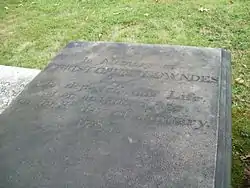Christopher Lowndes
Christopher Lowndes (baptized June 19, 1713 – January 8, 1785) was a leading merchant and slave trader in colonial Bladensburg, Prince George's County, Maryland. He was named Commissioner of the town of Bladensburg in 1745, and in 1753 he was appointed one of the justices of Prince George's County, holding both offices until his death in 1785.[1] He was the senior partner in Christopher Lowndes and Company which also included his brother Edward Lowndes, John Hardman and William Whalley.[2]

Biography
Christopher Lowndes was the fifth son of Richard Lowndes of Bostock House in Hassall, Cheshire, England and Margaret (née Poole). He was baptized at Sandbach on June 19, 1713.
As early as 1738, he was living in Prince George's County, Maryland. In 1748, he was the senior partner in the firm of Christopher Lowndes and Company operating both in Maryland and in Liverpool, England.[2] Christopher Lowndes was one of the Justices of Prince George's County from 1753 to 1775, and was of the Quorum from 1769. On June 4, 1777, he was commissioned under the new State government as one of the Justices of the county and Judge of the Orphans Court.
He died at Bladensburg on January 8, 1785.[3] He was buried at St. Matthew's Church, Seat Pleasant, Maryland.[4]
Business endeavors
In May 1752 Lowndes and his brother-in-law, Benjamin Tasker, Jr. were listed in the advertisement in The Maryland Gazette announcing the arrival of the Elijah with its cargo of "healthy slaves" for sale at Severn River.[2][5] Christopher Lowndes and Company ships made a total of ninety-nine different voyages carrying 14,834 slaves.[6]:650 Christopher and his brothers, Edward Lowndes and Charles and Christopher's son Francis-"invested in ships that made thirty-seven voyages between 1746 and 1770 and carried 9,637 slaves."[2] According to the Trans-Atlantic Slave Trade Database on average 13.5 percent of the slaves on a Lowndes ship died in transit. Most of their ships sailed to the Caribbean rather than to North America.[2]
Other
Lowndes was builder and architect of St. Barnabas' Episcopal Church, Leeland in 1772.[7]
Family
On May 14, 1747, Lowndes married Elizabeth Tasker (February 4, 1726 – September 19, 1789), daughter of Benjamin Tasker, Sr., President of the Council of Maryland, at St. Anne's Parish in Annapolis, Maryland. They had nine children, and their daughter Rebecca Lowndes (1757-February 10, 1802) was married on June 17, 1781 to Benjamin Stoddert (1751-1813), first Secretary of the Navy of the United States. His great-grandson, Lloyd Lowndes, Jr. (1845-1905) was a U.S. congressman and Governor of Maryland from 1896 to 1900.[3]
Legacy
In 1748 he built a mansion in Baldensburg known as Bostwick[2] that was listed on the National Register of Historic Places in 1975.[8] One source of that wealth was the transatlantic slave trade.[2]
References
- "Bostwick". Maryland Historical Trust. Retrieved 2009-09-12.
- Johnston, James H. (2012). From Slave Ship to Harvard: Yarrow Mamout and the History of an African American Family. Fordham University Press. p. 201. ISBN 978-0823239504.
- Johnston, Christopher (1907). Maryland historical magazine, Volume 2. Maryland Historical Society. pp. 276–279. Retrieved 2009-09-12.
- "St. Matthew's Church". Maryland Historical Trust. Retrieved 2008-10-29.
- "Just imported". The Maryland Gazette. May 28, 1752.
In the Elijah, Captain James Lowe, directly from the coast of Africa, a parcel of healthy slaves, consisting of men, women and children, and will be disposed of on board the said vessel in Severn River on Thursday the 4th day of June for sterling money, bills of exchange, gold or paper currency. signed, Benjamin Tasker, Junior and Christopher Lowndes
- Miller, Lillian B. (ed.). The Selected Papers of Charles Wilson Peale and His Family. 3. New Haven: Yale University Press. ISBN 0300025769.
- "Our History". St. Barnabas Episcopal Church, Leeland. Archived from the original on 10 November 2012. Retrieved 22 January 2013.
- "National Register Information System". National Register of Historic Places. National Park Service. April 15, 2008.